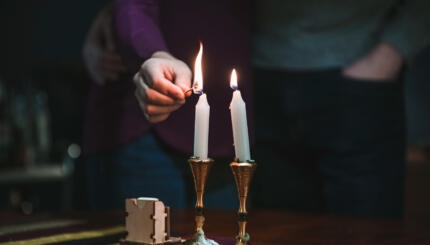Torah References to the “First Day of the Seventh Month”
In Leviticus, the first day of the seventh month is described as follows:
In the seventh month on the first day of the month, you shall observe complete rest, a sacred occasion commemorated with loud blasts. You shall not work at your occupations; and you shall bring an offering by fire to the Lord (Leviticus 23:24-25).
In Numbers, we read:
In the seventh month, on the first day of the month, you shall observe a sacred occasion: you shall not work at your occupations…. You shall observe it as a day when the horn is sounded. You shall present a burnt offering of pleasing odor to the Lord (Numbers 29:1-2).
The sacred number seven seems critical here. Just as the seventh day of the week is holy, so the seventh month of the year has special significance. Since each new moon is a sacred time, it is logical that the seventh new moon — counting from the month of Nisan, in the spring — should also acquire a special aura of holiness. That special sacredness is commemorated by the sounding of the shofar, the ram’s horn. Aside from sacrifice, this is the only specific action mandated for this day in the Torah. Sounding the shofar is mentioned in both sets of verses, although no explanation or reason is offered. Taken together, the three elements of these verses — the lack of a name for the holiday, of a reason for the celebration, and of an explanation for sounding the shofar — pose a puzzle for us: why doesn’t the Torah describe or emphasize this holy day any further?
Many scholars have suggested that the first day of the seventh month was popularly celebrated in ancient Israel as a divine coronation day, the time of God’s assumption of the kingship and the beginning of a new cycle of the year. There were two celebrations of a new annual cycle in ancient Israel, one in the spring month of Aviv (later called Nisan), “the first of the months of the year” (Exodus 12:2), and another in the fall at “the turn of the year” (Exodus 23:16; 34:22). The spring celebration was more cultic in nature, being connected to the cycle of sacred festivals and the reign of kings, while that of the fall emphasized the agricultural cycle.
With your help, My Jewish Learning can provide endless opportunities for learning, connection and discovery.
The suggestion that a new year’s festival was held in ancient Israel on the first day of the seventh month is based upon an analogy to Babylonian rites (two separate new year celebrations were held in Babylonia as well) and upon allusions to such a commemoration found in the psalms. As Moshe Segal points out:
[T]hree principles, the creation of the world on the New Year, the manifestation of God’s kingship over the world on the New Year, and the judgment of the world by God on the New Year. . . are already proclaimed together in a series of liturgical psalms that form a distinct group marked by a close affinity of tone, of language, and of thought. These are the joyous and triumphant songs contained in Psalms 95-100, to which belong also Psalm 93 and the first part of Psalm 94. The constantly recurring thoughts in these beautiful songs are God as creator, God as King, God as judge. [“The Religion of Israel Before Sinai”, Jewish Quarterly Review 52, 1963, p. 52]
The Still-Unnamed Holiday in the Book of Psalms and Prophets
Several of these psalms allude to the one commandment specifically connected to this day, the sounding of the shofar. The teruah, one of the sounds of the shofar, is referred to in Psalms 95:1,2; 98:4, 6; and 100:1 and should be differentiated from another sound mentioned in the Bible in connection to other holy days, the teki’ah, the sound of the trumpet. In these particular psalms, the shofar sound is a joyous proclamation of God’s ascendancy to the kingship and has none of the other connotations it received in later Jewish thought. Another scholar, Baruch Levine, offers a different suggestion, that the day was commemorated by blasting the shofar in order to announce that the festival of Sukkot was to commence two weeks later. [The JPS Torah Commentary: Leviticus, Jewish Publication Society, Philadelphia, 1989, p. 160.]
Although the Bible had not yet conferred a title on Rosh Hashanah (literally, the beginning or head of the year), and although it had not yet connected that holiday to Yom Kippur, it is nonetheless conceivable that the first of Tishre was thought of, even in early times, as a time of “cosmic judgment. . . when the destiny of the world was fixed.”
Why, then, this reticence on the part of the Torah to ascribe all these meanings more explicitly to “the first day of the seventh month”? Perhaps the pagan connotations of this day were still too strong. After all, the Babylonian celebration centered upon struggles between gods and demons for dominance and was characterized by the use of magic and incantations. Nothing of paganism remains, however, in the psalms. Mosaic monotheism had already transformed this day completely into the prototype of Rosh Hashanah as we now know it. If these psalms were indeed intended for recitation on the first of the seventh month, then even at this early date the Israelite new year festival celebrated the Lord as the sole creator of the world, who on this day ascended the throne and ruled over all of creation. The holiday was intended (at least in part) to acknowledge God by the people Israel as the righteous judge who dispenses justice for all humankind.
The first day of the seventh month is mentioned in the Book of Nehemiah as a holy day upon which an important event took place in the year 444 BCE:
When the seventh month arrived–the Israelites being [settled] in their towns–the entire people assembled as one man in the square before the Water Gate, and they asked Ezra the scribe to bring the scroll of the Teaching of Moses with which the Lord had charged Israel. On the first day of the seventh month, Ezra the priest brought the Teaching before the congregation, men and women and all who could listen with understanding. He read from it, facing the square before the Water Gate, from the first light until midday… (Nehemiah 8:1‑3).
At this impressive gathering, the people of Israel renewed their covenant with God and accepted the Torah as their basic law. The people wept when they realized how far they had strayed from the teachings that were in the Torah. But they were admonished not to mourn because “this day is holy to the Lord your God” (Nehemiah 8:9). The holiness of the first day of the seventh month-‑made plain in this biblical narrative-‑may constitute the reason that it was chosen for this ceremony of reading and accepting the Law. At the same time, the Bible does not describe any specific New Year customs observed on that day.
Philo of Alexandria, the first‑century BCE Jewish philosopher, describes the first day of the seventh month as the great “Trumpet Feast” and connects it with the sounding of the horn at Mount Sinai when revelation took place. He also interprets the trumpet as an instrument and symbol of war:
Therefore the law instituted this feast figured by that instrument of war the trumpet, which gives it its name, to be as a thank offering to God the peace‑maker and peace‑keeper, who destroys faction both in cities and in the various parts of the universe and creates plenty and fertility and abundance of other good things… (Philo, Special Laws, 2:188-192, Cambridge, 1962).
If Philo accurately represents the general understanding prevalent in his day, rather than an interpretation particular to him or to the Alexandrian community where he lived, then clearly the first day of the seventh month was not celebrated at that time as the “New Year.” If we are to assume that the New Year was popularly celebrated during the First Temple period, we must conclude that this tradition was forgotten during the exile and not renewed until later.
Of greatest import, however, is the information given in the Mishnah about the role of judgment on the first of Tishre, now designated simply “Rosh Hashanah:”
On Rosh Hashanah all human beings pass before Him as troops, as it is said, “the Lord looks down from heaven, He sees all mankind. From His dwelling place He gazes on all the inhabitants of the earth, He who fashions the hearts of them all, who discerns all their doings” (Psalms 33:13‑15) (Mishnah Rosh Hashanah 1.2).
This article is excerpted from Entering the High Holy Days. Reprinted with permission from the Jewish Publication Society.
Mishnah
Pronounced: MISH-nuh, Origin: Hebrew, code of Jewish law compiled in the first centuries of the Common Era. Together with the Gemara, it makes up the Talmud.
Moshe
Pronounced: moe-SHEH, Origin: Hebrew, Moses, whom God chooses to lead the Jews out of Egypt.
Rosh Hashanah
Pronounced: roshe hah-SHAH-nah, also roshe ha-shah-NAH, Origin: Hebrew, the Jewish new year.
shofar
Pronounced: sho-FAR or SHO-far, Origin: Hebrew, a ram’s horn that is sounded during the month of Elul, on Rosh Hashanah, and on Yom Kippur. It is mentioned numerous times in the Bible, in reference to its ceremonial use in the Temple and to its function as a signal-horn of war.
Sukkot
Pronounced: sue-KOTE, or SOOH-kuss (oo as in book), Origin: Hebrew, a harvest festival in which Jews eat inside temporary huts, falls in the Jewish month of Tishrei, which usually coincides with September or October.
Torah
Pronunced: TORE-uh, Origin: Hebrew, the Five Books of Moses.


